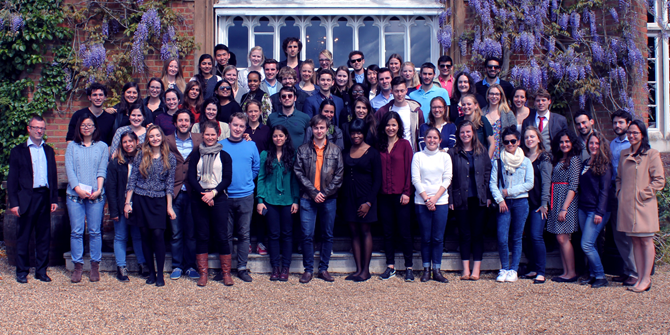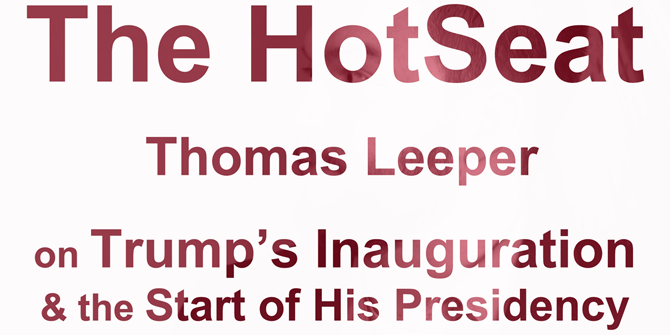MSc student Luis Cornago-Bonal reflects on the Conflict Research Group public event ‘Why International State-Building Fails: A new Interpretation’ where speaker Susan Woodward discussed her new book ‘The Ideology of Failed States: Why Intervention Fails’. Listen to the podcast.
According to Susan Woodward’s publication, The Ideology of Failed States: Why Intervention Fails, the term “failed state” makes no sense either theoretically or empirically, and its spread usage among donors, international organizations, and scholars is politically harmful and counterproductive. First, Woodward points out that very little research has identified the relationship between state failure and a series of unwanted outcomes that undoubtedly threaten international peace, such as revolutionary wars, ethnic wars, or adverse regime changes (for instance, how state failure causes terrorism or weapons of mass destruction proliferation or civil war). Indeed, Professor Woodward refers to the tautological character of most studies concerning failed states, that is, “the same empirical measures are used for both the cause and outcome”.
Second, because there is no real definition, it is extremely difficult to identify an actual failed state, compare it to other events, and measure how it varies empirically across countries. In order to demonstrate the empirical weaknesses of the term, Woodward discusses two different studies that question the supposed link between failed states and terrorist activity. For instance, according to Aidan Hehir’s research, there is no clear association between the number of terrorist organisations in a country and the country’s position on the Fund for Peace Failed State Index. Furthermore, “the threats to international security that first gave rise to the concept – civil war and refugees – and the threat that gave it a boost in 2002 – terrorism – have been in decline since the early 1990s”. Thus, for Woodward the actual picture appears very different from that displayed by the failed state argument.
Professor Woodward’s intervention at the London School of Economics was introduced by Denisa Kostovicova, associate Professor in Global Politics and convenor of MSc in Conflict Studies at LSE. Dr Kostovicova put emphasis on why Woodward’s book is such a significant contribution to the scholarship on failed states. According to Kostovicova, this publication tackles and tracks the ideology of the concept of failed states and its consequences and “it offers an opportunity to break the conceptual theoretical deadlock, reframe the debate and focus on effective policies to address the consequences of civil wars”.
Woodward began her talk at the London School of Economics and Political Science by briefly summarising some of the points explained above. Ms. Woodward also argued that scholars, academics, and students, who analyse what the term “failed state” means and the critical consequences of its usage, have the duty to do something about it. Ms. Woodward spoke more in-depth about the origins of the term, giving a historical account of how and in what context this term arrived. For her the origins of this term are not only a subject of intellectual curiosity, but have been critical in shaping action in the international sphere since the end of the Cold War. Although many people associate the concept of a failed state with Afghanistan and the National Security Strategy paper of the US Administration under President George W. Bush proclaiming that “the United States today is threatened less by conquering states than we are by weak and failing ones”, this author places its origins in the aftermath of the Cold War. As in many other times in history, the period just after the end of the Cold War can be analysed as a critical juncture where political actors were able to choose from different options and “those choices constrained later choices and pathways”. In this way, Ms. Woodward wants to underline that things could have turned out differently, as it was not clear that the failed state concept would succeed what she calls the “battle of concepts” in this international transition.
Once she had established how the term evolved through the 1990s and 2000s, Professor Woodward addressed the question of who uses it and why in order to explain the persistence of the concept “failed state”. First, Woodward argued that the concept of failed states is not just a simple label but an ideology, what she defined as a “set of beliefs and perceptions about a particular reality that provides shared meaning and enables social action around that set of beliefs”. Despite all the differences in goals, types of organisations or professional skills among a UN peace mission, a World Bank delegation or a development practitioner, they all agree with the fact that state-building is necessary and “refer to this project as building internationally responsible states”. However, the research literature on state building intervention since 1991 or 1992 summarised by Woodward in her book is very critical of the results. Both the empirical research on cases conducted by scholars and the monitoring reports or evaluations produced by the state-building organisations have usually concluded that state-building practices have undermined the state, leaving it weaker than it was or than it would have been if left alone. Woodward even suggested that state failure has been sometimes explained as a consequence of international state building interventions, mentioning the case of Afghanistan in 2002 among others.
After giving an overview of the different proposed explanations for these negative outcomes given by different authors, Woodward proposed her own explanation. First, she argued that international state building activities are not focused on local actors and institutions in the targeted state. Instead, these organisations put their efforts into building their own capacity for state building and related interventions. An example of this is shown by the fact that 70% of aid goes towards technical assistance, that is, to outsiders from donor countries who come as advisors. The fact that locals are never called experts and only outsiders are labelled as experts is for Professor Woodward a good illustration of the situation.
Furthermore, there are other reasons that could explain, according to Woodward, why intervention fails. For instance, the relative volatility of aid flows, the sectoral and geographical fragmentation of the aid, and the long delays in the dispensation of committed funds complicate the work of local government’s officials who are unable to handle the overload. Although outsiders complain about the lack of leadership and inability to plan among local authorities, Woodward points out that often the international organisations could also manage the aid differently.
Professor Woodward concluded her intervention by returning to the 1990s, to the origins of the ideology of failed states, as well as the idea of the linkage between development and security. She noted that development organisations, such as the World Bank, and security organisations, such as NATO, remain completely separate. This separation is problematic as was the case in during the Ebola crisis in Liberia, where “the neglect of alternative policies on security with communities, on the one hand, and delays on genuine development policies, on the other, had a shocking comeuppance when the Ebola virus erupted” in August-September 2014. Lastly, Woodward denied recent accusations that she is against any type of intervention. Rather, she stressed the need to learn from past mistakes and to rethink today’s international system, as we did in 1945 after the Second World War. There are now enough reasons to think that we are once again at a critical juncture, given the situation in countries such as “Libya, South Sudan, Mali, and the overlapping conflict across Syria, Iraq, and the new formation called the Islamic State in the Middle East after 2011”. Therefore, the choices we make now will be highly relevant to the international system of the upcoming decades. Woodward’s argument is that “at the international level [change] must take place and should be watched”.
After Woodward’s intervention Christine Cheng, lecturer in War Studies at King’s College London, pointed out some of the virtues of this book, in particular emphasising its provocative approach and how it embodies a type of academic research that speak truth to power, even if that truth is deeply unpleasant and critical. On the other hand, Professor Cheng casted doubt on the idea that international donors and interveners operate in a deliberate and strategic way. According to Cheng, incompetence plays often a more important role than deliberate strategy. Furthermore, she argued that ideology requires some type of consciousness, something that from her point of view is missing in the case of development aid and international donors. In this way, she affirmed that there is not enough organization to get to the point where we could say that it is an ideology.
During the last part of the event a very engaged audience become part of the conversation with Professor Woodward asking a wide range of questions. These questions included topics such as the role of China in foreign aid and international development, how to decide which local actors we should listen to, under what circumstances intervention would be more legitimate and to what extent we can talk about the “ideology of failed nations”.
 Luis Cornago Bonal holds a dual bachelor in Political Science and Sociology from Universidad Carlos III de Madrid (UC3M) and is pursuing a master’s degree in comparative politics at the London School of Economics and Political Science. He has been the recipient of the “la Caixa” scholarship (2017) to carry out postgraduate studies in the United Kingdom. His research interests lie in the challenges of welfare state institutions, preferences towards redistribution and labor market duality across advanced capitalist democracies.
Luis Cornago Bonal holds a dual bachelor in Political Science and Sociology from Universidad Carlos III de Madrid (UC3M) and is pursuing a master’s degree in comparative politics at the London School of Economics and Political Science. He has been the recipient of the “la Caixa” scholarship (2017) to carry out postgraduate studies in the United Kingdom. His research interests lie in the challenges of welfare state institutions, preferences towards redistribution and labor market duality across advanced capitalist democracies.
Note: this article gives the views of the author, and not the position of the LSE Department of Government, nor of the London School of Economics.






